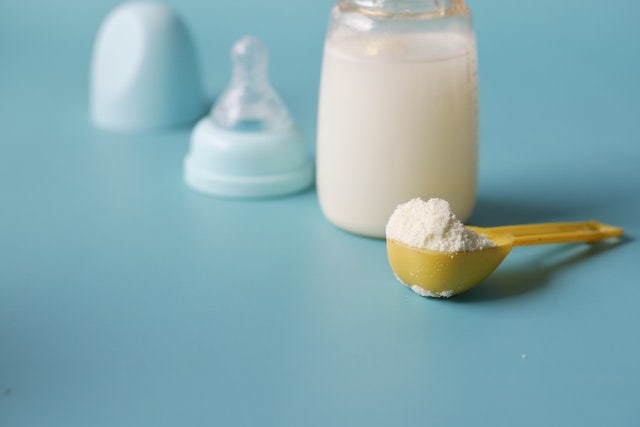When you’re a new parent, one of the most stressful situations is running out of baby formula. Whether it’s because you forgot to restock or your baby is consuming more than expected, it can be overwhelming to figure out what to do next.
Fortunately, there are several emergency baby formula substitutes that you can use in a pinch.
Understanding baby formula is crucial when it comes to finding an alternative. Baby formula is designed to provide all the necessary nutrients for your baby’s growth and development.
It typically contains a combination of proteins, carbohydrates, fats, vitamins, and minerals that are necessary for a baby’s health. When looking for a substitute, it’s important to find a product that contains similar nutrients.
If you find yourself in a situation where you’ve run out of baby formula, don’t panic. There are several emergency substitutes that you can use until you’re able to restock.
However, it’s important to understand the potential risks of using formula substitutes and to seek professional advice if you have any concerns.
Key Takeaways
- There are emergency baby formula substitutes available if you run out of formula.
- Understanding baby formula is crucial when it comes to finding a substitute.
- It’s important to understand the potential risks of using formula substitutes and to seek professional advice if you have any concerns.
Understanding Baby Formula
Baby formula, also known as infant formula, is a type of milk that is specifically designed to provide infants with the necessary nutrients for healthy growth and development. It is a popular alternative to breast milk for mothers who are unable or choose not to breastfeed their babies.
The FDA regulates baby formula to ensure that it meets certain nutritional standards. Baby formula typically contains a combination of proteins, carbohydrates, fats, vitamins, and minerals that are essential for a baby’s growth and development.
There are several types of baby formula available, including:
- Cow’s milk-based formula: This is the most commonly used type of baby formula and is made from cow’s milk that has been modified to make it easier for babies to digest.
- Soy-based formula: This type of formula is made from soy protein and is a good option for babies who are allergic to cow’s milk.
- Hydrolyzed formula: This type of formula is made from proteins that have been broken down into smaller pieces, making them easier for babies to digest.
It is important to choose the right type of baby formula for your baby’s needs. Your pediatrician can help you determine which type of formula is best for your baby.
In addition to choosing the right type of formula, it is also important to follow the instructions on the package carefully. This will ensure that your baby is getting the right amount of nutrients and that the formula is being prepared and stored safely.
If you run out of baby formula, there are some safe alternatives that you can use temporarily, such as whole cow’s milk or goat’s milk.
However, it is important to note that these alternatives do not provide the same level of nutrients as baby formula and should only be used in an emergency situation.
Reasons for Running Out of Baby Formula
Parents rely on baby formula to ensure their child is getting the proper nutrition they need to grow and develop. Unfortunately, there are several reasons why a parent may run out of baby formula.
Formula Shortage
One of the most common reasons for running out of baby formula is a shortage in the supply. This can be caused by a variety of factors, such as an increase in demand or a decrease in production.
When a formula shortage occurs, it can be difficult for parents to find the brand and type of formula their baby needs.
Formula Recall
In some cases, a formula recall may occur due to safety concerns. This can be caused by contamination or other issues that could harm a baby.
When a formula recall occurs, parents may need to switch to a different brand or type of formula, which can be challenging if the recalled formula was the only one their baby could tolerate.
COVID-19 Pandemic
The COVID-19 pandemic has had a significant impact on the supply chain, which can affect the availability of baby formula. With disruptions in transportation and manufacturing, it can be difficult for companies to keep up with the demand for formula.
Additionally, panic buying and stockpiling can exacerbate the issue, leaving some parents without the formula they need.
Supply Chain
Even without a pandemic, the supply chain can be a source of issues for baby formula availability. If there are disruptions in the supply chain, such as a delay in shipping or a shortage of raw materials, it can impact the production and availability of formula.
Manufacturer Issues
Issues with the manufacturer can also lead to a shortage of baby formula. This can include problems with production, quality control, or distribution. If a manufacturer is experiencing issues, it can impact the availability of their formula.
In conclusion, there are several reasons why a parent may run out of baby formula. These can include a formula shortage, a recall, disruptions in the supply chain, issues with the manufacturer, or the COVID-19 pandemic.
It is important for parents to plan ahead and have a backup plan in case they run out of formula, such as having a different brand or type on hand or considering alternative sources of nutrition.
Emergency Baby Formula Substitutes
In an emergency situation where baby formula is not available, there are several substitutes that can be used to ensure that the baby is still receiving proper nutrition.
It is important to note that these substitutes should only be used in the short-term and should not replace regular baby formula.
Homemade Formula
Homemade baby formula can be made using ingredients that are readily available in most households. However, it is important to note that homemade formula should only be used in an emergency situation and should not be used as a regular substitute for baby formula.
To make homemade baby formula, mix the following ingredients in a blender:
- 1 cup whole milk
- 1 tablespoon vegetable oil
- 2 tablespoons sugar or corn syrup
- 1/4 teaspoon salt
Goat Milk
Goat milk is a popular substitute for baby formula as it is easier to digest than cow milk. However, it is important to note that goat milk does not contain the same nutrients as baby formula and should only be used in an emergency situation.
To use goat milk as a substitute for baby formula, mix it with an equal amount of water and add sugar or corn syrup for sweetness.
Cow Milk
Cow milk is not recommended as a substitute for baby formula as it is difficult for babies to digest and does not contain the same nutrients as baby formula. However, in an emergency situation, cow milk can be used as a substitute for baby formula.
To use cow milk as a substitute for baby formula, mix it with an equal amount of water and add sugar or corn syrup for sweetness.
Soy Milk
Soy milk is a popular substitute for baby formula for babies who are lactose intolerant or allergic to cow milk. However, it is important to note that soy milk does not contain the same nutrients as baby formula and should only be used in an emergency situation.
To use soy milk as a substitute for baby formula, mix it with an equal amount of water and add sugar or corn syrup for sweetness.
Plant-Based Milk
Plant-based milk, such as almond milk or coconut milk, can be used as a substitute for baby formula in an emergency situation. However, it is important to note that plant-based milk does not contain the same nutrients as baby formula and should only be used in the short-term.
To use plant-based milk as a substitute for baby formula, mix it with an equal amount of water and add sugar or corn syrup for sweetness.
Evaporated Whole Milk
Evaporated whole milk can be used as a substitute for baby formula in an emergency situation. However, it is important to note that evaporated whole milk does not contain the same nutrients as baby formula and should only be used in the short-term.
To use evaporated whole milk as a substitute for baby formula, mix it with an equal amount of water and add sugar or corn syrup for sweetness.
Coconut Water
Coconut water can be used as a substitute for baby formula in an emergency situation. However, it is important to note that coconut water does not contain the same nutrients as baby formula and should only be used in the short-term.
To use coconut water as a substitute for baby formula, mix it with an equal amount of water and add sugar or corn syrup for sweetness.
Oral Rehydration Solution and Pedialyte
Oral rehydration solution and Pedialyte are not substitutes for baby formula, but they can be used to prevent dehydration in babies. These solutions contain the necessary electrolytes and fluids to prevent dehydration.
To use oral rehydration solution or Pedialyte, follow the instructions on the package and consult with a healthcare professional if necessary.
Potential Risks of Formula Substitutes
Parents who run out of baby formula may be tempted to use alternative substitutes, but these alternatives come with potential risks. It is important to understand the possible dangers associated with using formula substitutes to avoid harming the baby’s health.
Water Intoxication and Hyponatremia
Using excessive amounts of water to dilute formula can lead to water intoxication and hyponatremia in infants. Water intoxication occurs when a baby consumes too much water, causing the body’s salt levels to become diluted. This can lead to seizures, coma, and even death.
Metabolic Acidosis
Formula substitutes that are high in sugar can cause metabolic acidosis in infants. This condition occurs when there is too much acid in the body, which can cause damage to organs and tissues.
Water Toxicity
Using contaminated water to prepare formula substitutes can lead to water toxicity in infants. Harmful bacteria such as E. coli and Salmonella can be present in contaminated water, causing diarrhea, vomiting, and other serious health problems.
Nutritional Deficiencies
Formula substitutes lack the essential nutrients found in baby formula, such as iron, calcium, and vitamins. This can lead to nutritional deficiencies in infants, which can cause developmental delays and other health problems.
Iron Deficiency
Iron is an essential nutrient for infants, and formula substitutes lack the necessary amount of iron. Iron deficiency can lead to anemia, which can cause fatigue, weakness, and other health problems.
In conclusion, using formula substitutes can be dangerous for infants and should be avoided whenever possible. Parents should always ensure that they have an adequate supply of baby formula on hand and seek medical advice if they run out.
Related: Best mini fridge for breast milk
Breastfeeding as an Alternative
Breastfeeding is a natural and healthy way to provide nutrition for infants. Breast milk is the ideal food for babies as it provides all the necessary nutrients and antibodies to help protect against infections and illnesses.
If a parent runs out of baby formula, breastfeeding can be a viable alternative.
Breastfeeding can be done directly from the breast or through pumping and bottle-feeding. If a parent is struggling with breastfeeding, they can seek help from a lactation consultant who can provide guidance and support.
For parents who are unable to breastfeed, there are also breast milk banks where they can obtain donated breast milk. It is important to note that breast milk from a milk bank is pasteurized and screened for diseases to ensure safety.
It is important to remember that breastfeeding is not always possible or desired for every parent and infant. If a parent chooses not to breastfeed or is unable to, there are alternative options available such as formula feeding.
It is always best to consult with a healthcare provider to determine the best course of action for the individual situation.
Introducing Solid Foods
When a baby runs out of formula, introducing solid foods can be a good option. However, it is important to note that solid foods should only be introduced when the baby is developmentally ready, typically around 6 months of age.
When introducing solid foods, it is important to start with single-ingredient purees such as mashed bananas, sweet potatoes, or avocado. These foods are easy to digest and are less likely to cause an allergic reaction.
As the baby gets used to eating solid foods, parents can gradually introduce more complex purees and finger foods. It is important to offer a variety of foods to ensure that the baby is getting all of the necessary nutrients.
Iron-rich solid foods, such as pureed meats, beans, and fortified cereals, are particularly important for babies as they transition to solid foods. Iron is essential for healthy brain development and can help prevent anemia.
It is also important to remember that solid foods should not replace breast milk or formula as the primary source of nutrition for babies under 12 months of age. Breast milk or formula should still be offered before or after solid food feedings.
Overall, introducing solid foods can be a fun and exciting milestone for both parents and babies. By following these guidelines and introducing a variety of nutrient-rich foods, parents can help ensure their baby is getting the nutrition they need to grow and thrive.
Seeking Professional Advice
If a caregiver has run out of baby formula, it is important to seek professional advice before turning to alternative options.
The following entities can provide expert advice on what to do next:
Pediatrician
The first point of contact should be the child’s pediatrician. They can provide guidance on what to do if the baby is out of formula. The pediatrician can provide alternative options, such as prescribing a different formula or suggesting a temporary switch to a different type of milk.
American Academy of Pediatrics (AAP)
The AAP is a professional organization that provides advice and guidance on pediatric health issues. Their website provides information on infant feeding and what to do if a caregiver runs out of formula. They recommend contacting a pediatrician or a lactation consultant for advice.
Expert Advice
In addition to the pediatrician and the AAP, there are other experts who can provide advice on infant feeding. Lactation consultants and nutritionists can provide guidance on alternative feeding options and how to ensure the baby is getting the nutrients they need.
It is important to seek professional advice before turning to alternative options, as some options may not be safe or appropriate for the baby. It is also important to ensure that the baby is getting the nutrients they need for proper growth and development.
Community Support and Resources
When it comes to finding a solution to the problem of running out of baby formula, there are several community support and resources available. These resources can be a lifesaver for parents who are struggling to make ends meet.
One of the most well-known resources is the Women, Infants, and Children (WIC) program. This program provides assistance to low-income families with young children, including formula and other necessary items.
To qualify for WIC, families must meet certain income requirements and have a child under the age of five.
Another option is to visit a local food bank. Many food banks offer baby formula as part of their services. Parents can check with their local food bank to see if they have formula available and what the requirements are to receive it.
Formula samples can also be a helpful resource. Many formula companies offer free samples of their products to parents. These samples can be found online or by contacting the company directly.
Social media groups, such as Facebook groups, can also be a valuable resource for parents in need. These groups are often created by parents who have gone through similar experiences and can offer advice and support.
Parents can search for groups related to baby formula or parenting in general to find helpful resources.
Overall, there are several community support and resources available for parents who have run out of baby formula. By utilizing these resources, parents can ensure that their child’s needs are met, even in difficult times.
Understanding Formula Brands
When it comes to baby formula, there are several brands available in the market. Each brand has its own unique formula and ingredients. It is important to understand the differences between these brands to make an informed decision on which one to use.
Similac and Enfamil are two of the most popular brands of baby formula. Both brands offer a range of options for different stages of a baby’s development.
Similac is known for its OptiGRO formula, which contains DHA, lutein, and vitamin E. Enfamil, on the other hand, offers a range of formulas that cater to different needs, including those with sensitive stomachs.
Abbott Nutrition is another brand that offers baby formula. Their formula is designed to support a baby’s growth and development. They offer a range of options, including Similac and PediaSure.
It is important to note that not all babies may tolerate these brands of formula. Some babies may have an allergy or intolerance to certain ingredients. In these cases, parents may need to consider using a specialized formula or consulting with a pediatrician.
Toddler formula is also available for babies over 12 months old. These formulas are designed to provide the necessary nutrients for a growing toddler. However, it is important to note that a balanced diet of solid foods is also important for a toddler’s development.
In summary, understanding the different formula brands available can help parents make an informed decision on which one to use for their baby. It is important to consider a baby’s individual needs and consult with a pediatrician if necessary.
Related post: Baby Hates Formula All of a Sudden
Frequently Asked Questions
What are some emergency formula substitutes for a baby?
In case of an emergency, there are some formula substitutes that can be used for a baby. These include cow’s milk, goat’s milk, soy milk, and homemade formula. However, it’s important to note that these substitutes should only be used as a last resort and under the guidance of a healthcare professional.
What can I feed my baby if I don’t have formula?
If you don’t have formula, you can feed your baby breast milk, if available. If breast milk is not available, you can use emergency formula substitutes such as cow’s milk, goat’s milk, soy milk, and homemade formula.
However, it’s important to note that these substitutes should only be used as a last resort and under the guidance of a healthcare professional.
Is it safe to replace baby formula with milk?
It’s not recommended to replace baby formula with milk, as milk does not contain all the necessary nutrients that a baby needs.
However, in an emergency situation, cow’s milk, goat’s milk, or soy milk can be used as a temporary substitute for baby formula. It’s important to dilute the milk with water and add sugar to match the sweetness of formula.
How long will the baby formula shortage last?
The duration of the baby formula shortage is uncertain and can vary depending on the location and the severity of the shortage. It’s important to stock up on formula whenever possible and have emergency substitutes available in case of a shortage.
Are there any apps to help find baby formula in an emergency?
There are several apps available that can help locate baby formula in an emergency. These apps include Babylist, Baby2Body, and Baby Connect. These apps can help parents find the nearest store that has baby formula in stock.
Can I use a different brand of formula if I run out?
If you run out of a particular brand of formula, you can use a different brand as long as it’s the same type of formula (i.e. if your baby is on a soy-based formula, you should use another soy-based formula).
However, it’s important to note that some babies may have difficulty adjusting to a new brand of formula, and it’s best to consult with a healthcare professional before making any changes.

Nurse Practitioner at Venus Med Spa



